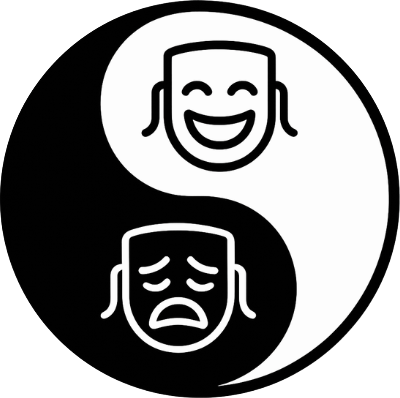PSA: Your Training is Yours

Once upon a time, my masochistic streak meant I was here 👏 for 👏 teachers and training that conflated "breaking actors down" with "actors breaking through". I still possess said masochistic streak; however, I'm no longer here 👏 for 👏 said teachers and training. One doesn't have to see much of the harm these approaches perpetuate before one becomes sad and angry.
Since starting Grad School, we've become acutely aware that the existing model of acting training is in serious need of an update. We're still negotiating how the beejezus we can help make that happen, but long-and-kinda-complicated story short: it's going to take a minute.
In the meantime, here are two truths we'd advise keeping front and centre.
Backed by science; built for the stage and screen.
👊 Actors:
Get evidence-informed insights and strategies to support your performance and well-being. Join the Dojo e-newsletter tribe and make thriving your reality.
🧭 Drama schools & Production companies:
Bring pioneering, research-backed coaching into your classroom or rehearsal room. Let’s talk about supporting your actors to perform at their peak – and stay well in the process.
Acting teachers aren't...
In most instances, registered psychologists, and in every instance, gods or gurus.
It's crucial to remember that "acting teacher" (at least in Australia, the UK, and the US) is an unstandardised, unregulated title.[1] While our acting teachers may be experienced and skilled actors/directors/practitioners, not all have teacher training,[2] and very few also have psychology training. And even if our teacher is one of the rarified latter, they might not be adept at judging when to wear their teacher hat and when to wear their psychologist hat.
We'd be the first to acknowledge how many incredible acting teachers there are and what incredible influences they can be. Good acting teachers can absolutely change their students' lives for the better. But it's also true that some acting teachers change their students' lives for the worse – commonly while playing psychologist, god, or guru roles they aren't qualified to play.[3] [4] [5]
Are we suggesting acting teachers be registered psychologists? No. That would be unrealistic and unnecessary. What we are suggesting is that acting teachers be responsible practitioners. And it's probably high time we address the lack of "an explicitly-stated code of ethics guiding the training of actors".[6] [7]
Acting training isn't...
For our validation, and certainly not for our teacher's validation.
Acting training exists exclusively for our personal and professional growth. Whenever the Dojo works with drama schools or acting institutions, we encourage students to be greedy for gains. To get out of their training what they want and need. This often requires learning new ways of being and doing, which is frequently challenging and disheartening and frustrating in the short term, but is what leads to success in the long term. If we go to class seeking validation or, heaven forbid, to validate our teachers, we'll likely try to bypass the messy middle of learning to make ourselves / our teachers feel better. Unfortunately, this comes at the cost of reaching our full potential. As we'll continue to quote until we bounce: "Hard choices, easy life. Easy choices, hard life".[8]
Also also also, homies, we pay to train. We seem to forget this non-trivial fact. We're paying to train. In no other payment-for-service exchange would we let this slide. We wouldn't pay an architect an extortionate fee to design a home and then settle for a sketch of a treehouse. We wouldn't visit our talk therapist every week if the expectation was we had to make them feel good about themselves. We're paying for a service.

Until the system shifts toward empowering its actors, we – as individuals – need to empower ourselves. We have to engage with teachers and training in a way that keeps our best interests the priority. We must be our own advocates in these spaces.
Summon self-awareness, know how you define success, set self-directed goals. And, if you'd ever like or benefit from some support, reach out. We aren't gods or gurus either, but we're sure as hell here to help you thrive however we can.
Love what you’re reading? Help us keep it flowing. Donations support the research, writing, and free sharing of evidence-informed tools for actor performance and well-being. Every dollar fuels our mission to make thriving a reality for actors everywhere 🔥
Citations
[1] Personal communications, June 18-25, 2024
[2] https://doi.org/10.1080/19443927.2014.993568
[3] https://doi.org/10.1080/19443927.2023.2191986
[5] https://ro.ecu.edu.au/theses/1804/
[6] https://doi.org/10.1353/tt.2010.0006
Cite us!
IG: @theactorsdojo
APA 7: Norrish, T. (2024, August 30). PSA: Your training is yours. The Actor’s Dojo. https://www.dojoactors.com/your-training/
